- Home
- Martin Cruz Smith
Tatiana Page 3
Tatiana Read online
Page 3
Arkady wished he had such insights. His mind was hung up on details. What of the neighbor? Who heard her screams? Screaming what?
Arkady felt painkillers lift him up to a dull euphoria. He could tell Zhenya had stopped by because a large chocolate chess piece wrapped in a bow sat on his nightstand. Arkady was a light sleeper but Zhenya was as elusive as a snow leopard.
A man confined to a few rooms becomes a meteorologist. Through the windowpane he charts clouds, tracks the stately passing of a thunderhead, notices the first streaks of rain. The bedroom wall becomes a screen on which he projects, “What if?” What if he had saved this woman? Or been saved? A person in this situation welcomes the clash and bang of a storm. Anything to interrupt a review of his life: Arkady Kyrilovich Renko, Senior Investigator for Very Important Cases, member of the Young Pioneers and a generation of “gilded youth” and, as luck would have it, an expert in self-destruction. His father, a military man, blew his head off. His mother, more genteel, weighted herself with stones and drowned. Arkady had dabbled in the act himself but been distracted at a critical moment and with that his suicide fever had passed. Still, with all this experience and expertise, he considered himself a fair judge of suicide. He defended the honor of people who killed themselves, the commitment that suicide demanded, the isolation and sweat, the willingness to follow through and open a second bottle of sleeping pills or make a deeper slice across the wrist. They had earned the title, and he was offended by the imposture of murder as something it was not. Tatiana Petrovna would no more have killed herself than flown to the moon.
When the tube was removed from Arkady’s chest, the doctor had said, “We will put on a clean bandage every day and tape you up. The hole will heal itself. Your ribs will heal too, if you let them. No twisting, lifting, cigarettes or sudden moves. Think of yourself as a broken cup.”
“I do.”
• • •
Arkady had asked Victor to go through police files and make a list of Tatiana Petrovna’s enemies.
“Incidentally, you look like hell,” Victor said.
“Thank you.”
The courtesies done, Victor sat by the bed and fanned a deck of index cards.
“Pick a card, any card.”
“Is this a game?” Arkady asked.
“What else? Seven people with excellent reasons to kill Tatiana.” He turned a card stapled to a color photo of a man with long bleached hair, evasive eyes and a tan. “Igor Mulovich threatened Tatiana in open court. He had recruited young women as models and sold them like meat in the Emirates.”
Arkady said, “I remember him.”
“You should. We arrested him, but it was Tatiana’s articles that nailed him. He served one year in prison camp. He bought a judge on appeal, got out and gets run over by a truck, so the laugh’s on him.”
Victor turned over another card to another familiar face. Aza Baron, formerly Baranovsky, a broker whose clients had enjoyed phenomenal returns until Tatiana Petrovna exposed his pyramid scheme. “Baron is in Israel fighting extradition.”
He turned over the third card.
“Tomsky. The big fish himself,” Arkady said.
“Himself.”
Kazimir Tomsky, deputy minister of defense. He had barely got his fingers in the pot when a Russian freighter limped into Malta. Its cargo had shifted in a storm and had to be reloaded. In the process, a dockside crane toppled and dropped crates labeled “Domestic Appliances.” What spilled out, however, were rocket-propelled grenades. Everyone knew that the arms had been illegally sold by men high and low in the Defense Ministry. Tatiana named them.
Tomsky spent time in prison. He had been released ten days before Tatiana Petrovna was killed.
“Definitely a candidate,” Arkady said.
“Except he went right to Brighton Beach to live with his mother. Too bad, he made a lovely candidate.”
“Who’s left?”
“The Shagelmans.”
“Husband and wife.”
Victor said, “I hear she’s a terrific cook, if you don’t mind picking fingers out of the stew. A sweet old lady who wants to transform Tatiana’s neighborhood into a shopping mall and spa. Between one court and another, Tatiana was costing the project a fortune in bribes, loans and lawyers. She really knows the law. The Shagelmans want to raze and clear the site before winter sets in, whatever that takes. For them, it’s a business decision, nothing personal.”
“Then there’s the joker.” A blank card popped up on Victor’s fingertips.
“Who is that?”
“I don’t know. Someone she opened her door to. A trusted friend.”
“What about Grisha? She did a piece on him a year ago that about took his hide off.”
“Grisha was dead already.”
“Don’t you find it interesting that they died within a day of each other? That’s quite a coincidence.”
“Coincidence is relative. When I go to a bar, it’s fate. If you’re there too, that’s coincidence.” Victor went back to his cards. “It just gets better. There’s Ape Beledon and Abdul, the Chechen superstar. I’ll nose around.”
“Give me a day and we’ll do it together.”
“As in, when I’m sober? Give me a little trust.”
“All the faith in the world.”
As for himself, Arkady knew he should quit the prosecutor’s office. He should have years ago, but there was always a reason to stay and a semblance of control, as if a man falling with an anvil in his hands could be said to be in control.
4
A dent in the ribs changed a person’s perspective. A walk down the street became fraught with potential disaster. A boy on a skateboard was a runaway bull. Driving the Niva’s manual shift demanded a stream of obscenities. His cell phone rang. Dr. Korsakova, a brain surgeon of his acquaintance. Another opinion he didn’t need. Arkady didn’t answer.
Tatiana’s building and the grounds around it seemed even more empty than before, no one about but old women who tipped from side to side as they dragged their shopping carts behind. A true dead end.
Arkady mashed all the buzzers on the call box before a girl carrying a poncho came to the front door. She couldn’t have been more than twenty, pretty in a street-urchin fashion, with a crust of mascara around the eyes and bleached hair as fine as chick’s fluff.
She said, “Another investigator? If you’re here about Tatiana, you’re a week too late. If you’re here about the building, turn the power back on.”
“I’m not here about the building.”
The girl explained that developers had been trying to get rid of Tatiana Petrovna for months. “They turned off the elevator and heat. Look at this lobby. Nothing but trash and dirty words. Mailboxes ripped open. Disgusting. At least the cats keep the rats down.”
“You mean there’s no one else in the building?”
“No, now that Tatiana is gone.”
“No staff?”
“No.”
“What floor are you on?”
“The sixth, the top. Right across from her.”
What else? Arkady thought.
“Your name is . . . ?”
“Svetlana.”
“You’re not working today?”
“I don’t know. We’ll find out.”
The stairs were tagged with suggestions of what people could do to themselves and declarations in red paint, “Spartak Rules!” and “Dynamo Sucks!” As he followed Svetlana he became aware that she was putting more sway into her steps than was absolutely necessary. You’re stirring a cold pot, he thought. Thank you for trying.
“So it was the two of you against the world.” As if Tatiana needed more enemies, he thought. The rubble outside could be cleared for a megamall or health club for members only. If Svetlana could be believed, she and Tatiana must have been a maddening roadblock. “Were you here when she died?”
“The night she went out the window? I heard her come in around midnight. That wasn’t unusual, she often worked la
te. She was famous, you know. She didn’t have to live here. I asked her once, and she said she liked to mess with the system.”
Arkady’s ribs fought every step and he was sweating by the third floor.
“You okay?” Svetlana looked back.
“Perfect. Did you talk to her that night?”
“No, but I heard her come in.”
“Alone?”
“I can’t say for sure, I could only hear her in the hallway.”
“And no one came after?”
“No.”
“You were friends.”
“Nobody would believe it, would they, her being who she was and all. She always brought milk for my cats. All she had to do was open her door and they’d start yowling.”
“Were you alone?”
“Oh, yeah.”
“How did you two meet?” Arkady asked. “At the fish market? On a tenants’ committee?”
“Not quite. At a drop.”
A “drop” was where men picked up prostitutes. It could be a traffic overpass, a pedestrian underpass, a children’s playground.
“I had a fight with a guy and I wasn’t in good shape. Tatiana saw me and took me in.”
“Like that?”
“Like that. She owned two apartments and she set me up here across from hers.”
“To protect you?”
“I dunno.”
“When was the last time you talked to her?”
“The day of the accident, a week ago.”
“How did she seem? Happy, normal, depressed?”
“Down.” The cats sensed something was wrong. They mewed the whole day. “Well, we’re here.”
He leaned against the wall and calculated how long it would take to roll down to the bottom. A police seal was plastered across the door and frame, and the door was locked. There were no signs of forced entry.
“So the police had a key?”
“I suppose. She always kept her door locked.”
“Where would they get a key?”
“Why are you asking all these questions? Everyone says it was suicide.”
“Can we talk in your apartment?”
Svetlana balked. “I dunno. Is this going to get me into trouble? Tatiana told me my rights. I don’t have to let anybody in.”
Arkady sneezed.
“How many cats?” he asked.
“Six. Do you like cats? I always feel they’re a good judge of character. You have to let them come to you.”
“Oh, they come.”
In Arkady’s experience, cats knew instantly who was allergic and gravitated to them. “You know, I’m like most people. Sometimes I forget my key or I can’t find it, so I give a copy to a neighbor. Now, you’re the only one here. You were doing Tatiana a favor.”
No response.
“The police report said that a neighbor heard screaming. That was you, right?” He gave her time to answer before he added, “Did the screaming start inside or outside on the balcony?”
Svetlana wiped her nose.
“Did she scream or did she shout? There’s a difference.”
Tears blurred her eyes but she said nothing.
“Did she call your name? You were the only other person in the building. Didn’t she know you were home?”
“I’ll get you the key,” Svetlana said.
There, he thought, not much crueler than carving out the answer with a knife. He needed the key. For an investigator, that excused everything, and when she opened her door, he stepped in after her.
A modest attempt had been made to turn the front room into a seraglio. Cheap Indian bedspreads hung in swags on the walls and over a narrow bed. A lava lamp stood on a nightstand, the lava limp on the bottom. Otherwise, Arkady saw nothing that couldn’t be fit into a suitcase for a quick getaway. And cats. They swarmed over and around Arkady’s feet, mewing piteously. While he was immobilized, Svetlana went to a connecting room and returned with a shiny, freshly cut key.
“A new copy?” Arkady asked.
“I’m so disorganized. I keep losing them.”
Most of the cats were gray striped, one a tabby, and another white.
“They earn their keep. Every night I chase them out to catch rats, except Snowflake.” She picked up the white cat. “Snowflake likes to hide and stay behind.”
“You discovered her body?”
“Yes. There was no one else to hear her scream.”
“Exactly what did you hear?”
Svetlana set the cat down. “Noises.”
“Noises like . . . ?”
“I don’t know. Furniture being moved.”
“She was your friend. Did you go to her door to ask why she would be moving furniture at midnight?”
“No.”
“Did she ever bring men to her apartment?”
“Of course. She was a very busy writer. That’s the thing about being like me and a writer like her, you meet all types.”
“All types?”
“She was involved in a lot of causes.”
“Such as . . . ?”
“Chechens, criminals, veterans.”
“Violent types?”
“Sure.”
“Were they violent with her?”
“No. Anyway, the police said it was suicide.”
“After moving her furniture.”
“The police said her door was locked. She was alone.”
“These officers, did you get their names?”
“Just police. They took my name in case there were questions.”
“Were there?”
“No.”
“But you identified her?”
“Yeah. What a mess.”
“I’m sorry you had to see that.”
“Thank you. You’re the first one to say so.”
His questions were repetitious, even confusing. It was like walking all around a horse before buying it. From the time Svetlana heard the scream until she found the body, how much time had elapsed? Five minutes? Ten?
“More like five.”
“It took you five minutes to react?”
“I guess so.”
It took a healthy young woman that long to descend six flights of stairs? If Svetlana was not an unreliable witness, her story had holes and ellipses.
“You’re sure you were alone in your apartment?”
“Yes. I told you before.”
“Right. How long are you going to stay here?”
“I don’t know. It’s day-to-day.”
Or minute-to-minute, Arkady thought. He took her cell phone number and gave her his card. “If you remember anything else, give me a call.”
Svetlana asked, “Those five minutes, do you think she was still alive?”
“From that fall? I think she died instantly. I doubt she felt a thing.”
“Who would do that?”
“I don’t know, I think Tatiana Petrovna had so many enemies they were tripping over each other.”
“Why do you care?”
“I don’t. Just curious.” An afterthought occurred to him. “How did your cats get on with her dog? I saw a dog in pictures of her.”
“Her pug? Little Polo? What a coward. He didn’t dare come in here.”
• • •
Arkady paused to pull on latex gloves before opening the door. He had high hopes. He expected the apartment to be a reflection of a well-ordered mind, and clean surfaces meant good fingerprints.
The balcony curtains were closed, allowing only chinks of light. He threw a light switch to no effect and remembered that the building’s power had been turned off. The beam of his penlight zigzagged to the dangling wires of a ceiling fixture. He aimed down and found that he couldn’t move without stepping on open books or broken glass. He let the beam crawl across the room to a sofa that was upended and gutted, spilling foam. Next to it was a desk stripped of its drawers. Folders were dumped out of file cabinets. Bookshelves were swept clear and loose papers strewn everywhere. Scattered shoe boxes held audi
ocassettes that went back twenty years according to their labels. The flotsam and jetsam of a professional reporter.
He took long, cautious steps to the kitchen. Everything that had been in a drawer or cabinet was on the floor. Knives glinted through a mélange of yogurt, melted ice cream and breakfast cereal. Both the refrigerator and the range had been moved aside. Two dog bowls, one upside down. In the bathroom, the medicine cabinet had been emptied into the sink. In the bedroom the mattress was filleted, her wardrobe tossed on the floor.
He crossed to the balcony and opened the doors. This was Tatiana’s last view, bleaker than Arkady had anticipated, far from the glass towers of millionaires. Even with the doors folded, there was only room on the balcony for two people. A plaque on the rail said, PLEASE DO NOT PLACE OBJECTS ON LEDGE. Good idea, Arkady thought. In the corner of the balcony lay an ashtray and a shriveled geranium in a pot.
He returned to the living room, crushing a shoe box of tapes on the floor, and picked up a tape recorder. He expected dead batteries. Instead he heard the stutter of machine-gun fire and a woman’s voice say, “Both sides have the same weapons. That’s because our Soviet soldiers have traded their weapons for vodka. Here in Afghanistan, vodka is the great equalizer.” Arkady tried another tape. “The sirens that you hear are ambulances taking children to a hospital already overflowing with casualties, over two hundred so far. It’s now clear there was no rescue plan. The prime minister has yet to visit the scene.” And a third. “The bomb went off during rush hour in the metro. Bodies and body parts are everywhere. We’re trying to move closer but some tunnels are so filled with black smoke it’s impossible to breathe or see.” History rushed by.
He put in a new cassette. At first he thought it was blank and then he picked up her low, soft voice. “People ask me is it worth it.”
A pause, but he knew that Tatiana was there on the other side of the tape. He could hear her breathing.
5
The next morning, Arkady felt curiously well. Part of it was Vicodin and part a sense that he had come into direct contact with Tatiana Petrovna and had an idea where to begin. Sergei Obolensky had been one of the few men who put up a fight outside Tatiana’s apartment building. He had been Tatiana’s closest friend on the magazine Now.

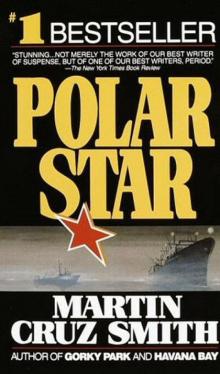 Polar Star
Polar Star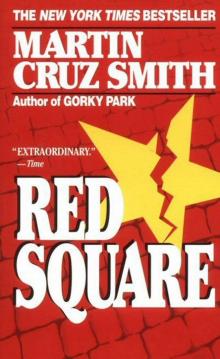 Red Square
Red Square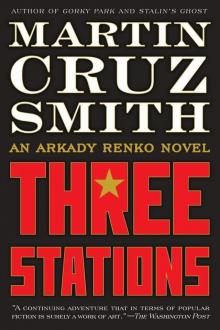 Three Stations
Three Stations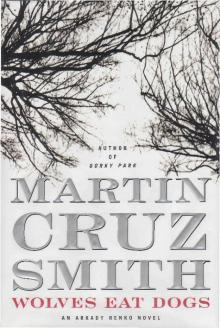 Wolves Eat Dogs
Wolves Eat Dogs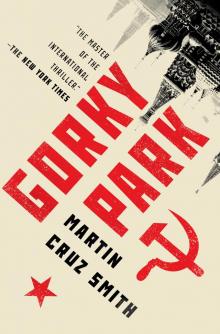 Gorky Park
Gorky Park December 6
December 6 Havana Bay
Havana Bay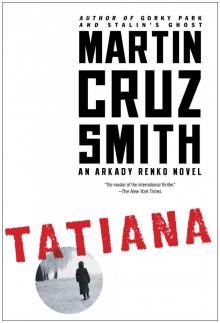 Tatiana
Tatiana The Girl From Venice
The Girl From Venice Stalin's Ghost
Stalin's Ghost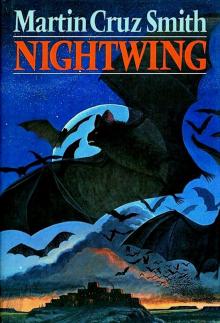 Nightwing
Nightwing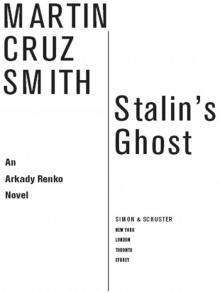 Stalin s Ghost
Stalin s Ghost Gypsy in Amber
Gypsy in Amber Rose
Rose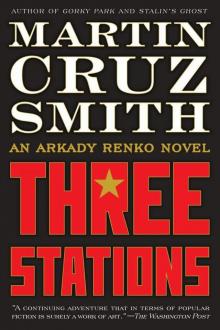 Three Stations: An Arkady Renko Novel
Three Stations: An Arkady Renko Novel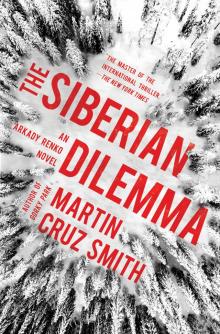 The Siberian Dilemma
The Siberian Dilemma December 6 (V5.0)
December 6 (V5.0)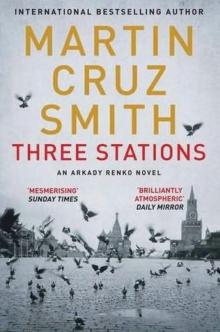 Three Stations ar-7
Three Stations ar-7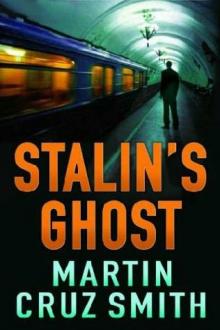 Stalin’s Ghost ar-6
Stalin’s Ghost ar-6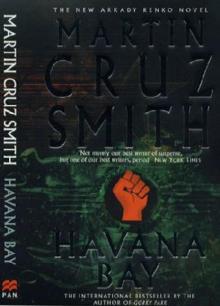 Havana Bay ar-4
Havana Bay ar-4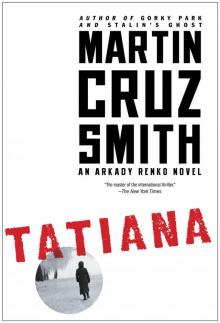 Tatiana ar-8
Tatiana ar-8